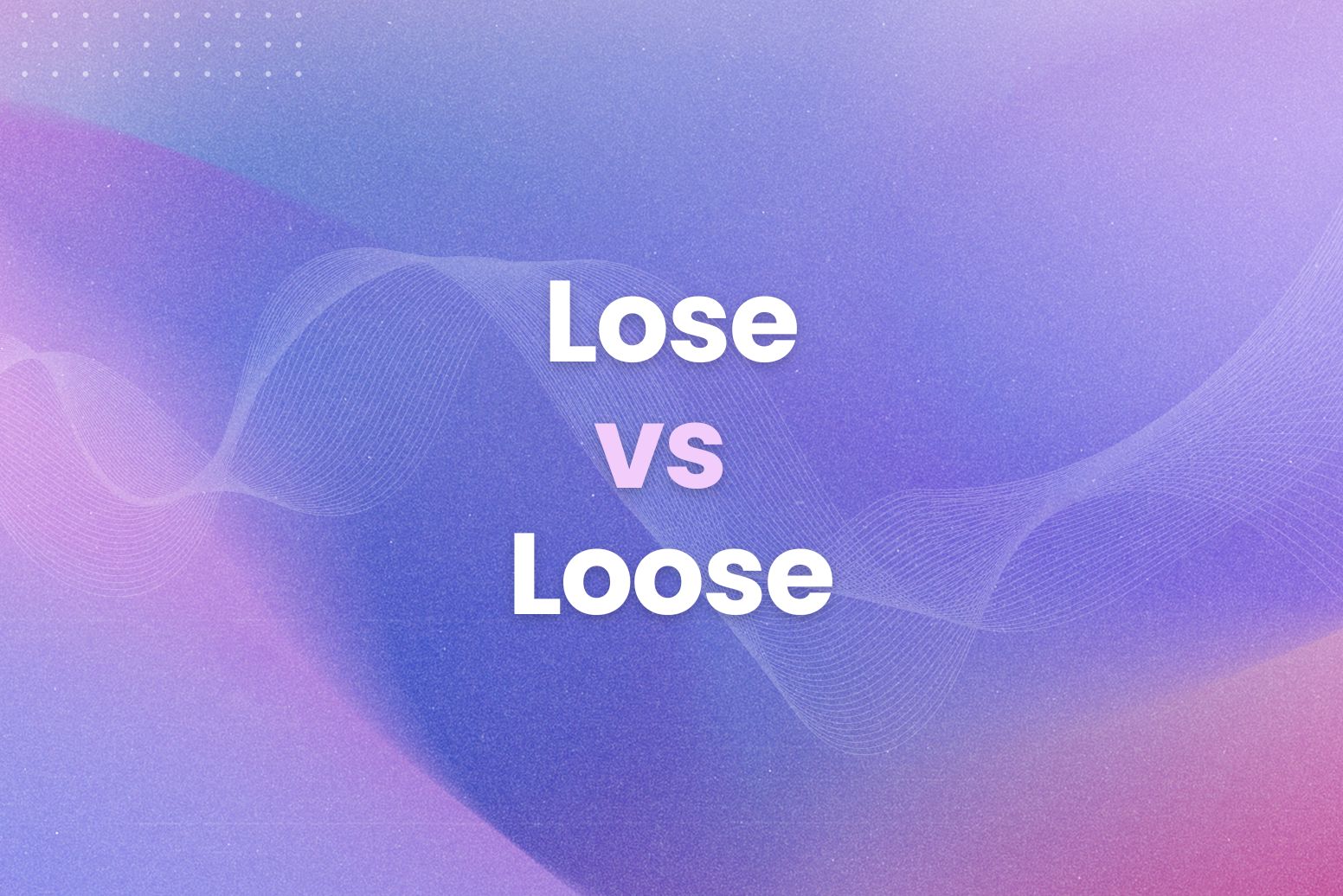One tiny typo can totally change your message. Imagine telling your boss you have loose morals when you meant you lost your keys. Yikes. Consequently, mastering lose vs loose is essential for clear communication. This seemingly small grammar hurdle trips up even seasoned writers. Therefore, we’re here to help.
This guide will clarify the difference once and for all. In short, you’ll learn how to use these words correctly every time. Here’s what we’ll cover:
- The core difference between “lose” (verb) and “loose” (adjective).
- Easy-to-remember tips and tricks.
- Real-world examples for practical application.
The Core Difference Between Lose vs Loose
“Lose” and “loose” sound almost identical. However, they have completely different meanings. Therefore, mixing them up creates confusion. In other words, it’s a grammar faux pas. This section will break down their distinct roles.
“Lose” is a verb. That is to say, it describes an action. For example, you can lose your keys, lose a game, or lose your way. Similarly, it can express the feeling of misplacing something. In addition, “lose” can mean to be defeated.
- Example: “I lose my train of thought sometimes.”
- Another Example: “Did your team lose the championship?”
“Loose,” on the other hand, is usually an adjective. That is to say, it describes a state or condition. For instance, a screw can be loose, clothing can be loose, or a dog can be loose in the neighborhood. In other words, it means not tight or fastened. Furthermore, it can mean not contained or restrained.
- Example: “The button on my shirt is loose.”
- Another Example: “There are some loose dogs running around the park.”
To clarify, think of it this way: you lose something tangible or intangible. But, something is loose. Above all, remember this core difference. It’s the key to using these words correctly.
Here’s a quick table to really solidify the difference between lose vs loose:
| Feature | Lose (Verb) | Loose (Adjective) |
| Part of Speech | Verb (action) | Adjective (describing) |
| Meaning | To misplace, be defeated, etc. | Not tight, not fastened, free |
| Example | I lose my wallet. | My pants are loose. |
Easy-to-Remember Tips and Tricks
Now that we’ve covered the basics, let’s explore some easy-to-remember tricks. These will help you distinguish between “lose” and “loose” every time. After that, you’ll be a pro.
Tip 1: The “O” Count
“Lose” has one “o,” similar to how you lose one item. However, “loose” has two “o’s,” like something with extra space. For instance, think of loose clothing that has more room. In addition, this visual cue can be super helpful.
Tip 2: Verb vs. Adjective
As previously mentioned, “lose” is a verb (an action). That is to say, it describes something you do. For example, you lose your keys (an action). On the other hand, “loose” is an adjective (a description). That is to say, it describes the state of something. For instance, a screw is loose (a state).
Tip 3: Think of Rhymes
This trick can really solidify the difference. For example, “lose” rhymes with “choose.” Therefore, you choose not to lose. Similarly, “loose” rhymes with “goose.” In other words, a loose goose might get away.
Tip 4: Use Arvin’s Grammar Check
Even with these tips, it’s always good to double-check. Consequently, using a grammar tool is a smart move. Arvin, the AI browser extension, can instantly scan your text for errors. For instance, if you accidentally type “I might loose my job,” Arvin will flag the error. In addition, it will suggest the correct spelling. This real-time feedback is invaluable.
Quick Recap of the Tips:
- One “o” for lose (like one lost item).
- Two “o’s” for loose (like extra space).
- “Lose” is an action (verb).
- “Loose” is a description (adjective).
- Use rhymes to remember.
- Use Arvin for instant checks.
By using these simple tricks, you’ll never mix up these words again. In short, you’ll write with more confidence.
Real-World Examples for Practical Application
Now, let’s put your knowledge to the test with some real-world examples. These examples will show you how lose vs loose are used in actual sentences. After that, you’ll be ready to use them yourself.
Examples with “Lose” (Verb)
- “If we lose this game, we’re out of the tournament.” (Meaning: to be defeated)
- “Be careful not to lose your wallet at the concert.” (Meaning: to misplace)
- “I tend to lose track of time when I’m reading a good book.” (Meaning: to fail to keep up with)
- “She didn’t want to lose her chance at the promotion.” (Meaning: to fail to obtain)
- “Don’t lose heart; you’ll get through this.” (Meaning: to become discouraged)
Examples with “Loose” (Adjective)
- “The dog’s collar is too loose; he could slip out.” (Meaning: not tight)
- “These pants are too loose around the waist.” (Meaning: not fitting snugly)
- “There were some loose papers scattered across the desk.” (Meaning: not bound or contained)
- “The handle on the door is loose and needs to be tightened.” (Meaning: not firmly attached)
- “He has a loose interpretation of the rules.” (Meaning: not strict or precise)
Putting It All Together
Let’s look at a few examples where both words appear in the same context. This will really highlight the difference.
- “If you lose that loose tooth, put it under your pillow.” (Meaning: If you misplace that tooth that is not firmly attached…)
- “Don’t lose the loose change in your pocket.” (Meaning: Don’t misplace the coins that are not contained securely…)
Pay close attention to the context of the sentence. This will tell you which word to use. For instance, if you’re describing the state of something, use “loose.” However, if you’re describing an action, use “lose.”
With these examples and the tips we’ve covered, you are now well-equipped to use “lose” and “loose” correctly.
Never Lose Track of Your Grammar Again with Arvin
Mastering “lose” vs. “loose” doesn’t have to be a struggle. We’ve covered the core difference, shared handy tips, and provided real-world examples. Therefore, you now have the tools to conquer this common grammar hurdle. Therefore, go ahead and write with confidence.
Here are the key takeaways on lose vs loose:
- “Lose” is a verb (action); “loose” is an adjective (description).
- One “o” for lose, two “o’s” for loose.
- Context is key to choosing the correct word.
- Rhymes can help you remember the difference.
Now, with a tool like Arvin, you have an AI-powered safety net. For instance, Arvin can instantly check your writing for “lose/loose” errors on any webpage. In short, it’s like having a grammar expert by your side, ensuring your writing is always polished and error-free. Therefore, you can focus on your message, not your grammar.
FAQs About Lose vs Loose
When to use lose or loose?
Use “lose” when you’re describing an action of misplacing something, being defeated, or failing to keep something. For instance, you lose your keys, lose a game, or lose your temper. In contrast, use “loose” when you’re describing the state of something being not tight, not fastened, or free. For example, a screw is loose, clothing is loose, or a dog is loose.
Is it lose money or loose money?
It’s “lose money.” “Lose” describes the action of no longer having money. For instance, “I lose money when I gamble.” In other words, the money disappears from your possession. In contrast, “loose money” doesn’t make sense grammatically.
Did you lose or loose weight?
It’s “lose weight.” “Lose” describes the action of reducing your weight. For example, “I’m trying to lose weight by exercising.” In other words, you are performing the action of losing.
Did you lose or loose the game?
It’s “lose the game.” “Lose” describes the action of being defeated in a game. For instance, “Our team did not lose the game.” In other words, your team did not perform the action of losing.








